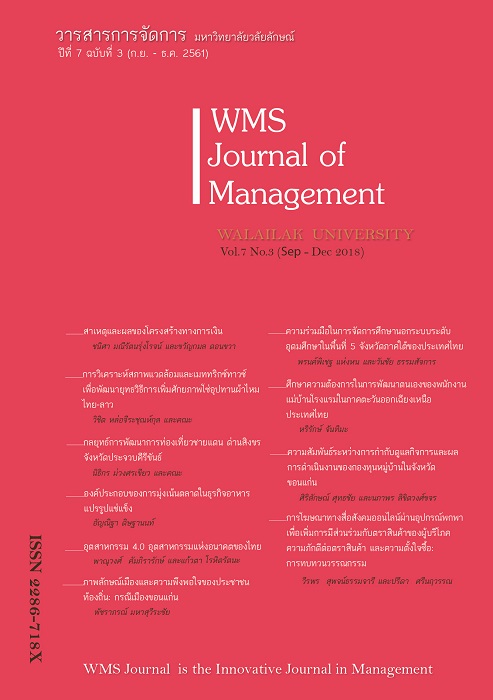A study of self-development needs of hotel housekeeper in the Northeastern Region of Thailand
Main Article Content
Abstract
This research is a quantitative research to study needs of self-development of the hotel housekeeper staff in Northeast. 2. to study of personal factors and compare an employee's personal factors in self-development in the Northeast. Finally, to present a self-development guideline of hotel housekeeper in the Northeastern Region of Thailand. The samples were 315 housekeepers in Northeast hotels, using the formula (Weiers, 2005) and using a proportion sampling method.
The results of this research found that the maid is mostly females, age 41-50 years, high school education and work experience less than 3 years monthly income was 5,000 -10,000 Baht. Most hotels have less than 100 rooms and an independent management type of hotel ownership. The housekeeper's learning needs to be learned from the cd and workshop format at work and training every three months. The demand for visualization is high; the highest average is personality development. The hypothesis test results showed that hotel housewives who had different sex; there is not significant. Other personal factors include age, income, level of education, working hours and the type of hotel management found that the need for self-development overall is significant; it was statistically significant at the 0.01 level. Work position in hotel housekeeping department and the number of hotel rooms found that the need for self-development overall is not significant. Some items were statistically significantly different at the 0.01 level.
Article Details
References
Chalong S. (2017). Hotel Business. Center for Economic, Business and Grassroots Econom Research foundations. Savings bank. Retrieved on May 18, 2560, from https://www.gsb.or.th/getattachment/27fb1900-1ced-4c83-a692.../ hotel management.
Department of Skill Development, Ministry of Labor. Advanced Vocational Training Course. According to the standards of occupational qualification of hotel’s housekeeping (Room attendant).
Keeratiwinidkul P., Taveepheep N., and Chatchai W., (2013). The Need of the Proficiency Development in Hotel Personnel of Rajabhat Universities in Bangkok. Suan Dusit Rajabhat University.
Kitpreedaborisuth B. (2008). Research Methodology in Social Science (10th Edition). Bangkok: Chamchuri Product.
Koonwong P. (2010). Needs for self-development of academic supporting staff, Faculty of Medicine, Chiang Mai University. Independent study, Master of Education College, Chiang Mai University.
Kongthon T. (2011), Alternative : Self development needs of personnel in the Metal Work Company Limited, Valaialongkorn University. Thesis, Master of Public Administration Program in Public Administration, Prathumthani
Krungphong S. (2013), Needs for Self Development of The Staffs at The Faculty of Commerce and Accountancy, Chulalongkorn University. Chulalongkorn University.
Nadler, L. and Nadler Z. (1989). Developing huma resource. (3nd ed). San Francisco: Jossey-Bass.
Panchu R. (2010). Human Resource Development in Hotel Business.Case study of Maritime Park & Spa Resort, Krabi. Master of Business Administration Business Administration Surat Thani Rajabhat University.
Pedler, M., Burgoyne J. and Boydell T. (2006). A Manager’s Guide to Self-Development.
Sairung S. (2014). Job Competencies for Hotel Employees in Muang District, Songkhla Province. Master of Business Administration Business, Songkhla Rajabhat University
Singh, A. (2015). Hotels Housekeeping Innovative Trends and Modern Practices- An overview. Journal for Studies in Management and Planning. 1 (3) 2015. 540-548. Retrieved May, 17, 2017. From http://internationaljournalofresearch.org/index.php/JSMaP
Srisaard B. (2002). The initial research. (7th Edition). Bangkok: Suviriyasarn.
TAT Intelligence Center. (2017). Tourism Authority of Thailand, Retrieved on March 18, 2017, from http://tatic.tourismthailand.org/home-tatic.
Thailand Professional Qualification Institute (Public Organization). (2015) Professional standards and professional qualifications. Bangkok.
Tirakanant S. (2013). Research Methodology in Social Science: A Path to Practice Bangkok: Chulalongkorn University.
Weier M. Ronald. (2005). Introduction to Business Statistics, International Student Edition, (5th ed). Pennsylvania, USA: Duxbury Press, Thomson-Brooks/cole
Wikumpapraharn K. (1996). A study of need for self-development of non-lecturer in Khon Kaen University. Master of Education Thesis, Educational Administration Branch, Graduate School, Khon Kaen University.
Batinić, I. (2015). Organization of Business in Hotel Housekeeping. Journal of Process Management – New Technologies, International 3, 1. 51-54.
Nadler, L. and Nadler Z. (1989). Developing huma resource. (3nd ed). San Francisco: Jossey-Bass.
Pedler, M., Burgoyne J. and Boydell T. (2006). A Manager’s Guide to Self-Development.
Singh, A. (2015). Hotels Housekeeping Innovative Trends and Modern Practices- An overview. Journal for Studies in Management and Planning. 1 (3) 2015. 540-548. Retrieved May, 17, 2017. From http://internationaljournalofresearch.org/index.php/JSMaP
Weier M. Ronald. (2005). Introduction to Business Statistics, International Student Edition, (5th ed). Pennsylvania, USA: Duxbury Press, Thomson-Brooks/cole

